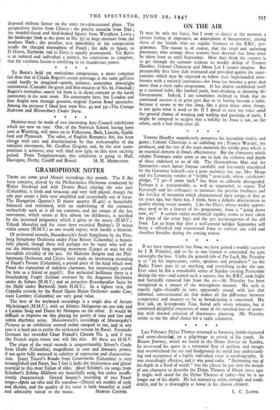ON THE AIR
IT may be only my fancy, but I seem to detect at the moment a certain feeling of emptiness, an atmosphere of bereavement, among those of my friends who are regular listeners to the B.B.C. pro- grammes. The reason is, of course, that the cruel and unfeeling potentates who arrange these matters have decreed that Itma must be taken from us until September. How they think the country is to get through the summer without its weekly dollop of Tommy Handley, Colonel Chinstrap and Mona Lot I cannot imagine. But presumably they have duly estimated and provided against the reper- cussions which may be expected to follow their high-handed inter- ference with a national institution—for Itma has become a great deal more than a mere radio programme. It has almost established itself as a national habit, like football pools, beer-drinking or damning the Government. Indeed, I am sometimes inclined to think that its continued success is in great part due to its having become a habit, because it seems to me that Irma, like a great many other things, is not quite what it used to be. If I dared to raise my voice amid the general chorus of weeping and wailing and gnashing of teeth, I might be tempted to sutitgest that a holiday for Irma is not, on the whole, such a bad thing after all.
* * * *
Tommy Handley magnficently preserves his incredible vitality and gusto ; Colonel Chinstrap is an unfailing joy ; Francis Worsley, the producer, and the rest of the team maintain the terrific pace which is an essential element in Itma's effectiveness. But the characters which inhabit Tomtopia today seem to me to lack the richness and depth of those endeared to us of old. The Gramophone Man and the Spoonerist—each lapsus linguae carefully and tiresomely elucidated by the Governor himself—are a poor exchange for, say, Mrs. Mopp and the Levantine vendor of " feelthy " postcards, whose valedictory pledge, " I go—I come back," has been so callously disregarded. Perhaps it is unreasonable, as well as ungrateful, to expect Ted Kavanagh and his colleagues to maintain the pristine freshness and the fertility of invention which characterised their scripts of five or six years ago, but there has, I think, been a definite deterioration in quality during recent months. Like the Diver, whose weekly appear- ance used to be a feature of the programme, Itma is "going down now, sir." A certain rather mechanical rigidity seems to have taken the place of the crazy logic and the gay inconsequence of the old Itma. Let us hope that after a well-earned holiday September will bring a refreshed and rejuvenated Irma to enliven our cold and cheerless firesides during the coming winter.
* * * *
If we have temporarily lost Irma, we have gained a weekly causerie by J. B. Priestley, and so far as one listener is concerned the gain outweighs the loss. Under the general title of Pot Luck, Mr. Priestley is to " air his impressions, views, opinions and prejudices " (as the Radio Times puts it) on anything and everything under the sun. Ever since he did a remarkable series of Sunday evening Postscripts during the war—and scored such a success that the B.B.C. took fright and hurriedly removed him from the air—Mr. Priestley has been recognised as a master of the microphone manner. His style is exactly right—friendly in tone, apparently casual, with just that informal, conversational air that makes all the difference between competence and mastery so far as broadcasting is concerned. His first talk, on Sevenpenny Teas, lasted only seven minutes, but it combined delightful evocations Of some of the vanished joys of yester- day with shrewd criticism of doctrinaire planning. Mr. Priestley seems to me the ideal choice for a radio columnist.
* * * *
Last February Dylan Thomas returned to Swansea, bomb-shattered and snow-shrouded, on a pilgrimage in search of his youth. In Return Journey, which we heard in the Home Service on Sunday, he re-created his quest in a torrential flow of epithets and images that overwhelmed the ear and bludgeoned the mind into understand- ing and acceptance of a highly individual essay in autobiography. It was exceedingly effective, and it was good radio. " Swimming out of his depth in a flood of words " was the phrase he put into the mouth of one character to describe the Dylan Thomas of fifteen years ago. It might well stand for the Dylan Thomas of today—but he is no longer out of his depth. He has learned to swim, strongly and confi- dently, and he is thoroughly at home in his chosen element.
L. C. LLOYD.


































 Previous page
Previous page